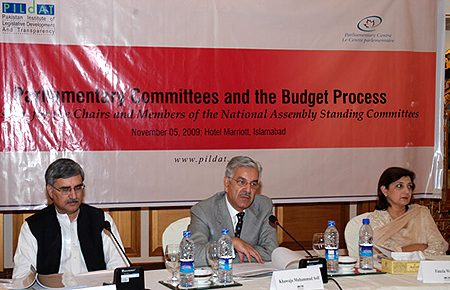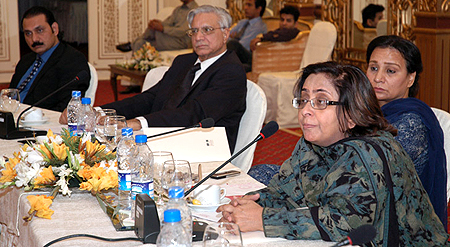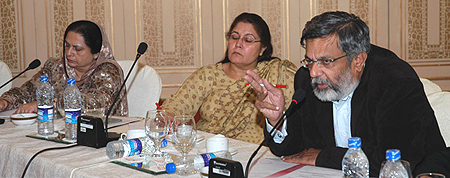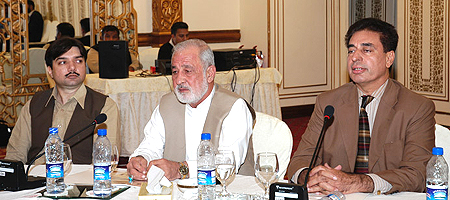| |
Islamabad, November 05: Chairs and members of the various standing committees, including the Finance Committee, reiterated that Parliamentary Committees need to take charge of the budget process and play an effective role during the budget cycle to give meaningful input into the federal budget. It was discussed that pre-budget public consultations need to be organised by the Committees, especially the Finance Committee, starting in December 2009 in major cities of the country so that a set of comprehensive budget proposals can be presented to the Finance Ministry by April 2010 for inclusions in the budget process. |
|
| |
These declarations were made at the PILDAT workshop on Parliamentary Committees and the Budget Process organised specifically for the chairs, members and staff of the National Assembly Standing Committees. The workshop was organised as a part of the Parliamentary and Political Party Strengthening Project being executed by PILDAT in association with the Ottawa-based Parliamentary Centre with the support of Canadian Department of Foreign Affairs and International Trade.
|
|
| |
Khawaja Muhammad Asif, MNA and former Federal Minister, and a member of the National Assembly Standing Committee on Finance of the National Assembly of Pakistan, was the keynote speaker at the workshop while Ms. Fauzia Wahab, MNA and Chairperson of the Standing Committee on Finance chaired the workshop. |
|
| |
Opening the workshop, Mr. Ahmed Bilal Mehboob said that as a non-partisan think tank working for strengthening Parliament and Democracy, PILDAT has believed that the existing budget process in Pakistan, especially its parliamentary aspects, need to be reviewed and amended by providing an effective role to the National Assembly Committees in the review of the budget proposals of the government, as well as establishing a process of public consultation, to allow a more meaningful parliamentary input and to increase transparency and accountability before passing the national budget. He lauded the role of the chair and various members of the standing committees who had shared the view on improvement in the budget process and were now poised to work together for required reform. |
|
| |
Participants of the workshop included 22 chairs and members from 18 different committees of the National Assembly of Pakistan in addition to committee staff mainly from the Finance, Defence, Planning and Development and Womens Development committees. PILDAT had prepared and disseminated a workshop pack that carried an overview of the current budgetary process, aims and objectives of public consultation and a CD containing resources on Canadian Parliamentary budget process. |
|
| |
Khawaja Muhammad Asif, MNA outlined the current role of standing committees and their potential role in the future of budget scrutiny. He explained relevant parliamentary rules and urged MPs to utilise their powers and their abilities to conduct public consultation exercises in relation to their various remits. The presentation outlined the support with which committees would be provided and details of the potential models which could be adopted in relation to public consultation. |
|
| |
There was discussion amongst MNAs attending as to whether they could effectively carry out consultation or successfully review budgetary items in the face of non-cooperation by the bureaucracy in the various Ministries falling within their committees� remits. Several MNAs expressed the view that progress would be difficult in the face of entrenched bureaucratic attitudes and that MNAs� powers and abilities remained limited. The Chair of the Finance Committee impressed upon the attendees the need to build capacity and to strengthen their awareness and abilities by being prepared, knowing their subject and questioning where necessary. |
|
| |
The Chair of the Defence Committee raised concerns in relation to the defence budget and the particular difficulties raised by lack of disclosure in relation to disaggregated defence budget data. She pointed out that this rendered meaningful scrutiny impossible and sought advice in relation to how members of the committee could, in future, plan strategies for obtaining more detailed information. Participants generally expressed their appreciation of PILDAT�s efforts to increase transparency and accountability and to increase capacity amongst parliamentarians. |
|
| |
Several members from the Finance Committee including Mr. Riaz Fatyana and Mr. Rasheed Godil stressed the need for making sub-committee of Finance Committee that should initiate public consultations in December. Chairs from various other committees including Defence, Information and Broadcasting, Social Welfare and Special Education, Economic Affairs & Statistics, Human Rights urged the Finance Committee to hold consultation amongst committees on how to move towards greater budget scrutiny and budgetary input at the committee level through public consultations and hearings. |
|
| |
|
|
| |

Khawaja Asif delivering a presentation at workshop |
|
| |
|
|
| |

Chair Defence Committee |
|
| |
|
|
| |

Participants |
|
| |
|
|
| |

Participants |
|